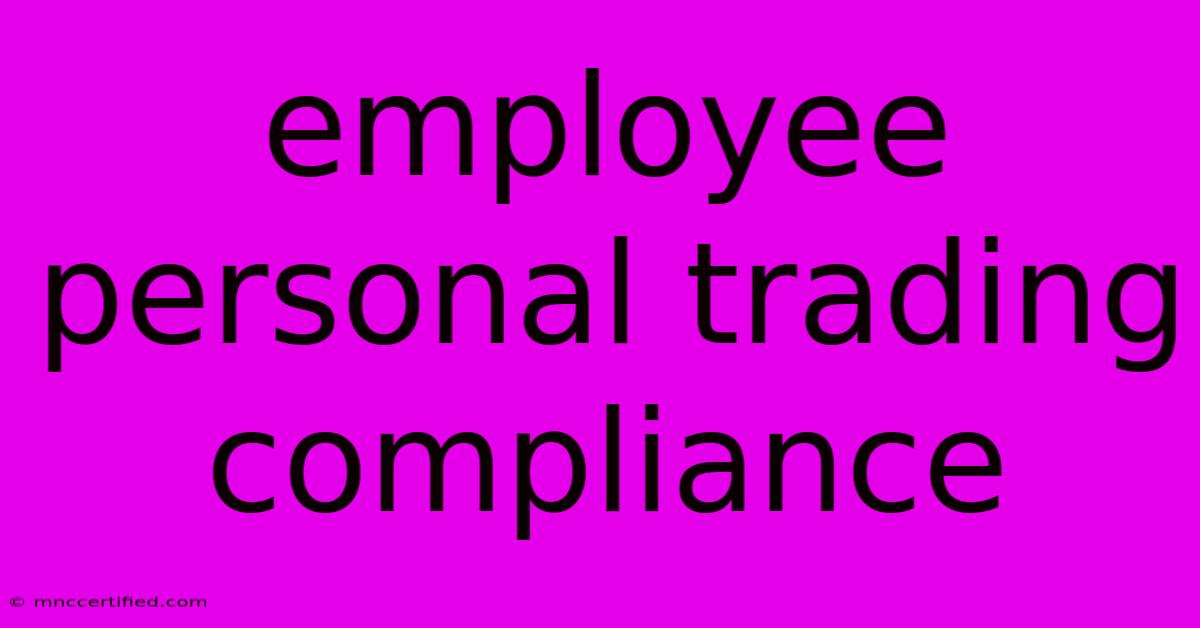Employee Personal Trading Compliance

Table of Contents
Navigating the Maze: Employee Personal Trading Compliance
In today's dynamic financial landscape, where information travels at lightning speed, ensuring employee personal trading compliance is crucial for any organization. This article delves into the complexities of this critical aspect, outlining key considerations, best practices, and the importance of a robust compliance framework.
Why is Employee Personal Trading Compliance Important?
Employee personal trading compliance is not just a regulatory requirement; it's a vital element of maintaining a company's integrity and reputation. Here's why:
- Protecting Confidential Information: Employees with access to sensitive, non-public information, like upcoming financial results, mergers, or product launches, must adhere to strict guidelines to prevent insider trading.
- Avoiding Conflicts of Interest: When an employee's personal trades potentially conflict with their professional obligations, it can erode trust and damage the company's standing.
- Maintaining Investor Confidence: Transparency and ethical conduct are paramount in financial markets. Compliance with trading restrictions reassures investors that the company operates with integrity.
- Minimizing Legal and Financial Risk: Violations of insider trading laws can lead to hefty fines, legal battles, and severe reputational damage for both the employee and the company.
The Pillars of a Robust Compliance Framework
Building a strong employee personal trading compliance program requires a multi-faceted approach:
1. Clear Policies and Procedures:
- Establish a comprehensive policy: This document should clearly define prohibited activities, trading restrictions, and reporting obligations.
- Pre-clearance procedures: Implement a system for employees to seek pre-clearance for any personal trades, especially those potentially involving company-related information.
- Prohibit insider trading: Absolutely prohibit any employee from using material non-public information (MNPI) for personal gain.
2. Training and Education:
- Regular training programs: Conduct mandatory training sessions for all employees, covering the company's policies, insider trading laws, and best practices for ethical trading.
- Communication is key: Keep employees informed about updates to policies, market trends, and potential risk areas.
- Encourage questions: Create a safe and open environment for employees to ask questions and address concerns.
3. Monitoring and Oversight:
- Automated systems: Utilize technology to monitor employee trading activity, flag potential conflicts, and analyze trading patterns.
- Internal audits: Conduct regular internal audits to assess the effectiveness of compliance procedures and identify any weaknesses.
- External reviews: Consider periodic reviews by independent experts to ensure the program is up-to-date and complies with evolving regulations.
4. Reporting and Enforcement:
- Whistleblower programs: Encourage employees to report any suspected violations of trading policies or insider trading.
- Disciplinary action: Establish clear consequences for violations, ranging from warnings to termination, depending on the severity of the offense.
Best Practices for Employees
Even with a robust compliance framework, individual employees play a crucial role in ensuring compliance. Here are some best practices for employees:
- Understand the policy: Familiarize yourself with the company's trading policy and its implications.
- Seek pre-clearance: Don't hesitate to request pre-clearance for any trades that might raise concerns.
- Avoid potential conflicts: Refrain from trading in securities related to your company or its competitors.
- Maintain accurate records: Keep detailed records of all your personal trading activities.
- Report any violations: If you witness or suspect a violation of trading policies, report it immediately.
Conclusion
Employee personal trading compliance is a critical component of maintaining ethical corporate behavior, protecting investor confidence, and minimizing legal and financial risks. Implementing a robust compliance program that encompasses clear policies, comprehensive training, ongoing monitoring, and effective reporting mechanisms is essential for navigating the complex world of personal trading in today's financial markets. Remember, staying informed and adhering to best practices are key to navigating this maze successfully.

Thank you for visiting our website wich cover about Employee Personal Trading Compliance. We hope the information provided has been useful to you. Feel free to contact us if you have any questions or need further assistance. See you next time and dont miss to bookmark.
Featured Posts
-
What Is Special Situations Investing
Nov 12, 2024
-
Is Dot Physical Covered By Insurance
Nov 12, 2024
-
Insurance Tech Innovation Conference
Nov 12, 2024
-
Life Insurance Policies And Medicaid
Nov 12, 2024
-
Charlies Angels Trading Cards Value
Nov 12, 2024